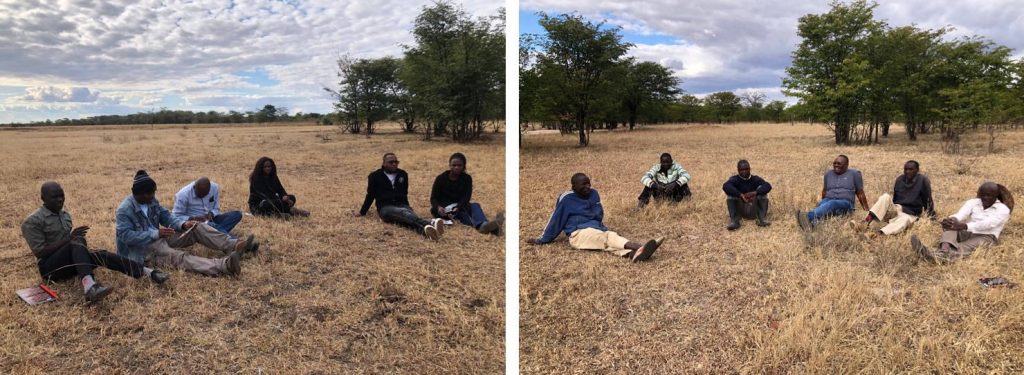By Kaala B. Moombe and Sandra Cordon

Between April and August 2022, the COLANDS team in Zambia organized two capacity building workshops, including an integrated landscape approach (ILA) reflection seminar, and a Training of Trainers workshop in participatory mapping held in Livingstone, Zambia on 23 June 2022.
Participatory mapping is an excellent tool for unravelling stakeholder perspectives of landscape dynamics and trade-offs, which are essential to understand when implementing ILAs. That was the background for the Trainers workshop that included forestry officers, ward councillors, village headmen, NGO staff, and researchers. Three COLANDS PhD student supervisors were also involved: Mirjam Ros-Tonen, Terry Sunderland, and James Reed. Participants were guided through the process of participatory mapping before attempting the technique themselves.
Supporting PhD and Masters students
This year, the Zambia team has also facilitated several scholarly studies. In the first several months of 2022, University of Amsterdam PhD student, Malaika P. Yanou, and University of British Columbia PhD student, Alida O’Connor, each completed their individual three-month data collection in Kalomo.
Additionally, two Pennsylvania State University students are being supported in their work by the Zambia team. Masters student Tiza Mfuni has been collecting data around Choma, Kalomo and Livingstone to respond to the research question: “How do narratives on drivers of biodiversity loss shape policy practitioners’ beliefs and priorities? A case study of Ghana and Zambia”. The objective of the data collection is to capture perspectives on biodiversity and biodiversity conservation in the Kalomo district landscape and in Southern Province. These perspectives on land use and land cover change (LULCC) were sought from natural resource administrators and managers in government at district and provincial levels.
PhD student Forrest Stagner is studying: “Toward a critical theory of socio-ecological resilience: Livestock management for climate change adaptation in Zambia”. This involves examining how livestock-based climate change resilience strategies are being mediated through social institutions in sub-Saharan Africa (SSA) by conducting a qualitative research study in two smallholder agricultural communities within Siachitema Chiefdom from early June to mid-August 2022. Some 32 semi-structured interviews, four community resource mapping (CRM) exercises, and four interviews with district-level government officers were conducted and information is now being analyzed.
Private-sector study published
In late August 2022, the COLANDS team manuscript: “Assessing the Potential for Private Sector Engagement in Integrated Landscape Approaches: Insights from Value-Chain Analyses in Southern Zambia” was accepted for publication in the journal ‘Land’. Authors are Pauliina Upla, James Reed, Kaala B. Moombe, Benjamin Kazule, Brian Mulenga, Mirjam Ros-Tonen and Terry Sunderland.
This study is focused on identifying potential entry points to engage more effectively with the private sector to improve resource management and commodity production – and potentially, reduce deforestation to mitigate climate change – which is a key research focus of the COLANDS Zambia team. The research, conducted in Kalomo district, will likely have implications for other regions and countries. Specifically, it aims to improve understanding of how commodity production impacts land use, local livelihoods, and environmental objectives. A particular focus is on the role and influence of different private-sector entities and actors along key value chains of maize, tobacco, cattle and charcoal. These four commodity supply chains were selected for their significant contribution towards livelihood strategies for communities in Kalomo district, in addition to their impact on deforestation and environmental degradation.
Findings from the study suggest potential entry points for enhanced private sector engagement in ILAs. Those key entry points are: improving water security for smallholders, empowering small and medium-sized enterprises (SMEs) as private sector actors, and collaborative planning for sustainable landscape activities. That, in turn, is expected to contribute to more equitable and sustainable landscape resources management in Kalomo.
Partnerships
Meanwhile, in terms of partnerships and rural development, the COLANDS teams in Zambia participated in an introductory meeting on 10 June 2022 with the the head of government, the Permanent Secretary (PS) for Southern Province of the country. During the meeting, the PS was briefed about the COLANDS project in general, and upcoming ILA and training workshops. A field visit to the Bbilili shrines (see photos) was also organized. The PS emphasised the need to both apply research results in development activities, and to communicate science to the local people in simple terms and language they understand. This way, science will create impact at the local level by guiding natural resource management and livelihood strategies.
As well, a letter of agreement was signed with the Zambia Community-Based Natural Resources Management Forum (CBNRMF), a CIFOR partner in the COLANDS initiative, to conduct visibility and awareness-raising activities that included raising the understanding of CBNRM, the challenges pertaining to the management of natural resources in an integrated manner and seeking ways to mitigate the challenges.




